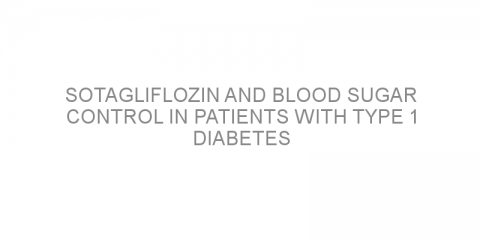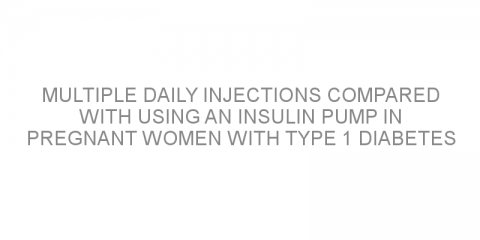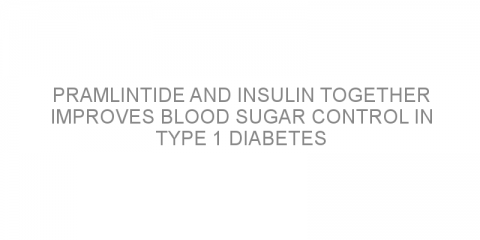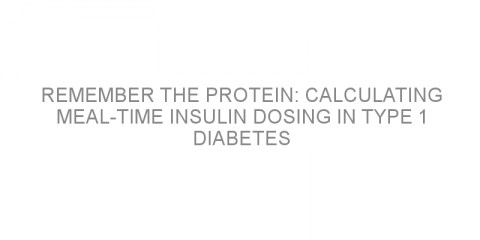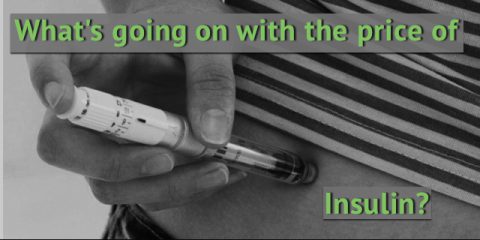In a nutshell The aim of this study was to examine the effects of sotagliflozin added to insulin on blood sugar levels in patients with type 1 diabetes (T1D). The main finding of the study was that sotagliflozin and insulin together improved blood sugar control in T1D. Some background The main treatment of T1D is insulin (the hormone...
Read MoreDiabetes medication(s)-Insulin Posts on Medivizor
Is it better to reduce basal insulin rate or remove insulin pump before exercise in type 1 diabetes?
In a nutshell The aim of this study was to investigate if reducing basal insulin rate (BRR) 90-minutes before exercise was better at preventing hypoglycemia (dangerously low blood glucose) than suspending the insulin pump (pump suspension; PS) in type 1 diabetes (T1D). The main finding was that BRR 90-minutes before exercise improved blood glucose...
Read MoreMultiple daily injections compared with using an insulin pump in pregnant women with type 1 diabetes
In a nutshell This study compared the effectivess of an insulin pump with multiple daily injections in patients with type 1 diabetes during pregnancy. The study found that women who used MDI had better blood sugar control and lower blood pressure. Some background Women with type 1 diabetes are able to have babies very safely, as long as their blood...
Read MorePramlintide and insulin together improves blood sugar control in type 1 diabetes
In a nutshell The aim of this study was to investigate the effectiveness of pramlintide (Symlin) with insulin on blood glucose control in a 24-hour period. The main finding of the study was that pramlintide improved blood glucose after meals and reduced the fluctuation in blood glucose levels in patients with type 1 diabetes (T1D). Some...
Read MoreLarge changes in day-to-day blood sugar levels and the risk of hypoglycemia
In a nutshell The aim of this study was to investigate the association between the day-to-day self-monitored blood glucose level differences and the risk of hypoglycemia in insulin-treated patients with type 1 and type 2 diabetes. The study found that bigger differences in day-to-day blood glucose levels were associated with a higher risk of hypoglycemia...
Read MoreHow safe and effective is the new fast-acting insulin therapy for type 1 diabetes?
In a nutshell This study investigated the safety and effectiveness of a new fast-acting insulin aspart at mealtimes and after meals as compared to traditional mealtime insulin in patients with type 1 diabetes (T1D). The main finding was that the fast-acting insulin aspart effectively controlled blood sugar levels in...
Read MoreLooking for people with type 1 diabetes to try an artificial pancreas
In a nutshell This clinical trial is investigating the effects of an artificial pancreas (AP) system on brain function in older adults with type 1 diabetes (T1D). The main outcome to be measured will be change in alternate fuel uptake by the brain during hypoglycemia (dangerously low blood glucose). The details Glucose is used as fuel by the brain and...
Read MoreRemember the protein: calculating meal-time insulin dosing in type 1 diabetes
In a nutshell This study examined whether the meal-time insulin dose should be calculated based on the carbohydrate count or the combination of carbohydrate plus protein. The study concluded that calculating the dose based on both carbohydrate and protein may be more effective. Some background Patients with type 1 diabetes can benefit from a...
Read MoreWhat’s going on with the price of Insulin?
And the prices of other medications in the US Type 1 diabetes is an autoimmune disease. That means that the person’s immune system attacks and destroys the cells in the pancreas (beta cells) that make insulin. Once those cells are destroyed, they don’t grow back. Type 1 diabetes is usually diagnosed in young people, before the age of 30, and most often...
Read MoreEffectiveness and safety of faster aspart
In a nutshell This study compared the effectiveness and safety of fast-acting insulin aspart (faster aspart) with conventional insulin aspart (IAsp) in people with type 1 diabetes (T1D). It was determined that faster aspart may be better at controlling blood glucose levels, without increasing the risk of side effects. Some background Reducing...
Read MoreLooking for children with type 2 diabetes to test alogliptin
In a nutshell This phase 3 trial aims to evaluate the safety and effectiveness of alogliptin (Nesina) in pediatric patients with type 2 diabetes. The main outcome to be investigated is the effect on blood glucose control after 26 weeks of treatment. The details Managing blood glucose levels is key in the treatment of type 2 diabetes....
Read MoreSafety and effectiveness of insulin glargine
In a nutshell This study examined the effectiveness and safety of two forms of insulin glargine in people with type 2 diabetes (T2D). It determined that both forms reduced HbA1c (measures average blood glucose over the last 3 months), but the more concentrated form was less likely to cause hypoglycemia (dangerously low blood glucose). Some background...
Read More
